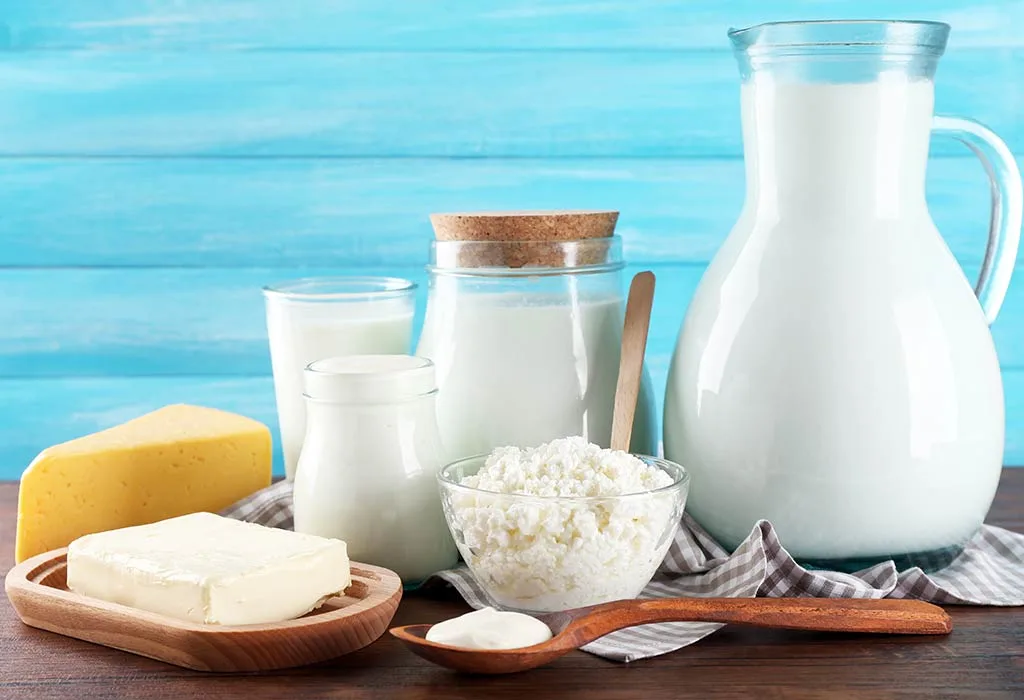Losing weight can feel like an uphill battle. With so much confusing and contradictory advice out there, it’s hard to know which foods and nutrients really help move the needle when it comes to slimming down. Dairy products are one food group that often get a bad rap when it comes to weight loss. But what does the science actually say? Read on for a deep dive into the complex relationship between dairy and weight management.
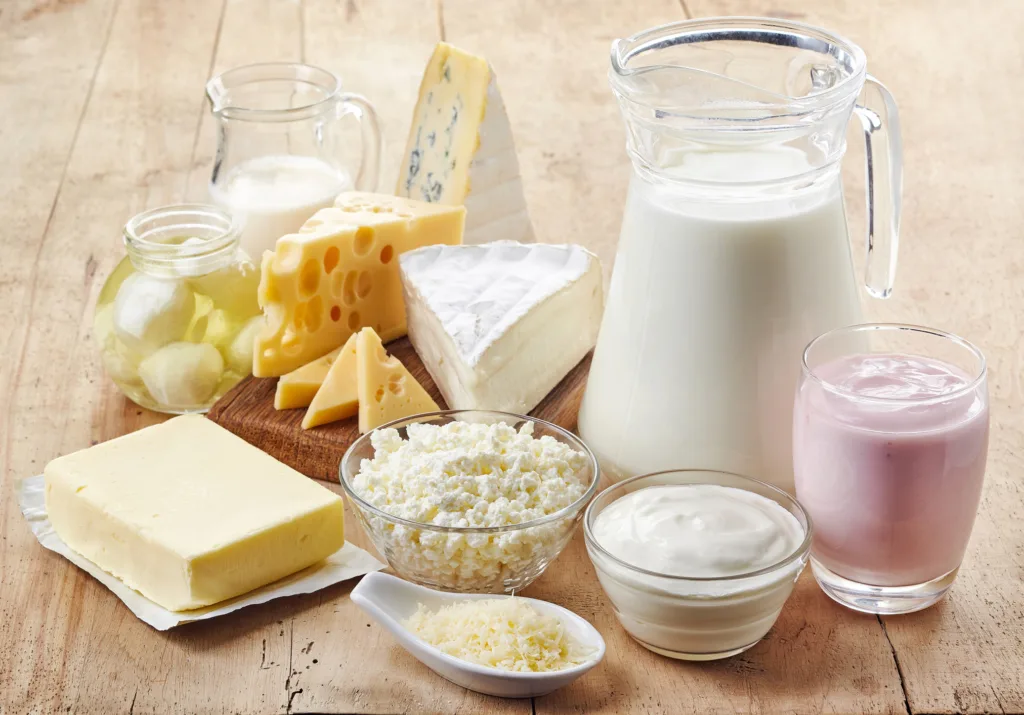
The Dairy Dilemma: Myths vs. Truths
First, let’s bust some common myths and misconceptions people have about dairy when it comes to weight:
Myth: Dairy is fattening and will make you gain weight.
Truth: Research shows dairy may actually help support weight loss! Multiple large observational studies have found that adults with higher dairy intake tend to have lower body weight and less body fat than those who consume little to no dairy. One analysis of 29 controlled weight loss trials concluded that increasing dairy intake as part of a calorie-controlled diet resulted in significantly greater reductions in both body weight and fat mass compared to low dairy diets. So despite the prevalent belief that dairy is a diet no-no, science shows it can be an ally when trying to slim down.
Myth: Dairy causes inflammation and bloating so you should avoid it when dieting.
Truth: For most people, enjoying dairy in moderation as part of a healthy diet is fine and beneficial. While some individuals do experience gas, bloating or other symptoms from dairy due to an allergy or lactose intolerance, these issues usually only arise if you have an underlying sensitivity. For people who tolerate dairy well, there is no evidence that it causes widespread inflammation or bloat when consumed in reasonable amounts as part of a nutritious diet. In fact, some studies suggest dairy may have anti-inflammatory properties!
Myth: You should only eat low-fat or nonfat dairy products when trying to lose weight.
Truth: Whole milk dairy foods may also aid fat loss! While conventional wisdom states that low-fat or skim milk products are best for dieting and weight control, emerging research suggests that whole milk dairy may also benefit weight management. Some studies indicate that whole milk may be more satiating than low-fat varieties due to its higher protein and fat content, keeping hunger at bay. Whole milk dairy products like yogurt, cheese, and even ice cream in moderate portions may help with fat loss while keeping you satisfied. More on the nuances soon!
The notion that all dairy universally leads to weight gain simply isn’t accurate. When consumed in moderate portions as part of a balanced diet, natural dairy products provide key nutrients that offer some surprising benefits for weight management. Which brings us to…
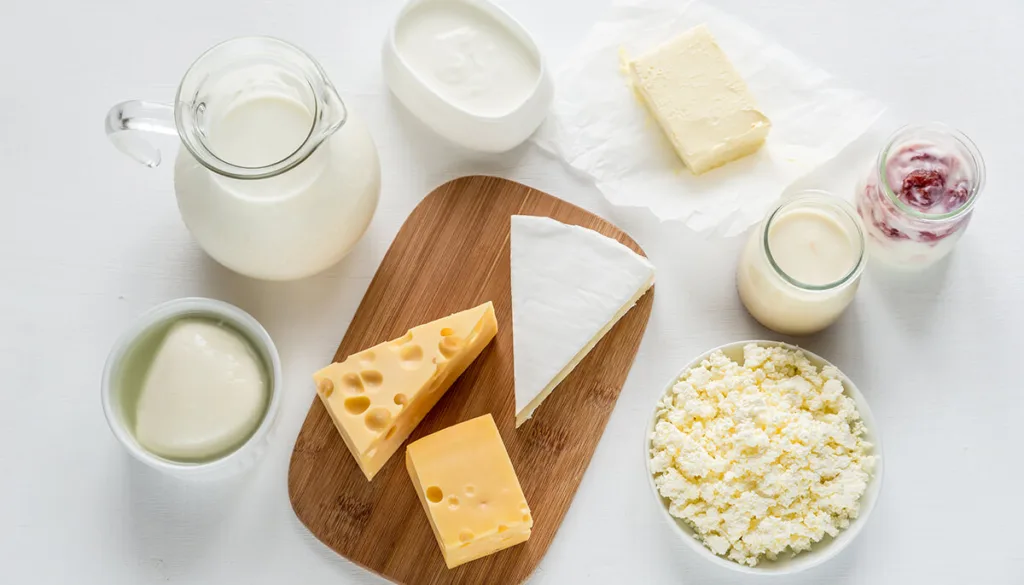
Why Dairy Supports Weight Loss
Dairy products like milk, yogurt and cheese are nutritional powerhouses packed with protein, calcium, vitamin D and more. Here are some of the ways the nutrients and components in dairy can directly or indirectly help slim your waistline:
Protein = Muscle + Satiety: The high quality, complete protein found in dairy foods helps build and maintain muscle mass. Packing on even a small amount of lean muscle is beneficial for weight loss because muscle tissue naturally boosts your resting metabolism, helping you burn extra calories around the clock. Meanwhile, protein is the most filling macronutrient, keeping you feeling fuller longer between meals which prevents overeating and destructive snacking. Consuming protein-rich Greek yogurt, cottage cheese, or milk at breakfast or snacks keeps hunger pangs at bay.
Calcium = Fat Burner: Calcium, which dairy products are loaded with, appears to directly stimulate lipolysis – essentially the breakdown of fat within cells. Research shows it triggers certain signals that tell your fat cells to release stored triglycerides then break them down so the fat can be burned for energy. Talk about a powerful fat-burning nutrient! Calcium also inhibits the enzyme responsible for forming and storing new fat in the body. Pretty nifty trick for helping shed extra pounds.
Conjugated Linoleic Acid (CLA) = Less Body Fat: CLA is a polyunsaturated fatty acid found in the fat of ruminant animals like cows, sheep, and goats. Whole milk dairy products are among the richest dietary sources of CLA. This unique fatty acid has been shown to help reduce body fat accumulation while improving overall body composition. Research indicates CLA helps block lipogenesis, or fat production and storage, while enhancing fat breakdown. Over time this can lead to less body fat.
Probiotics = Healthy Gut = Healthy Weight: Fermented dairy foods like yogurt, kefir, and certain aged cheeses contain probiotics, which are beneficial gut bacteria that serve many functions related to digestive and metabolic health. These good microbes help optimize gut function, improve barrier integrity to prevent leaky gut issues, reduce inflammation, and regulate digestion. A healthy, balanced gut microbiome has been linked to easier weight management as well as tighter control of appetite, reduced abdominal fat accumulation, balanced blood sugar levels, and other metabolic benefits.
Vitamin D = Additional Fat Burning: Vitamin D, abundantly present in dairy foods like cheese, yogurt, and fortified milk, helps boost calcium absorption and supports its fat-burning effects. Low vitamin D status is associated with increased risk of obesity and difficulty losing weight.
**Potassium, Phosphorus & More: **Milk and yogurt provide other minerals like potassium and phosphorus that support fluid balance, bone health, muscle function, satiety and glucose control – all of which influence weight management.
As you can see, dairy contains a wide array of beneficial nutrients that influence weight control in multiple ways. From protein to calcium, CLA to probiotics, the unique nutritional profile of low-sugar dairy foods contributes to their anti-obesity effects. Let’s now dive deeper into how dairy’s components support weight loss through different metabolic mechanisms.
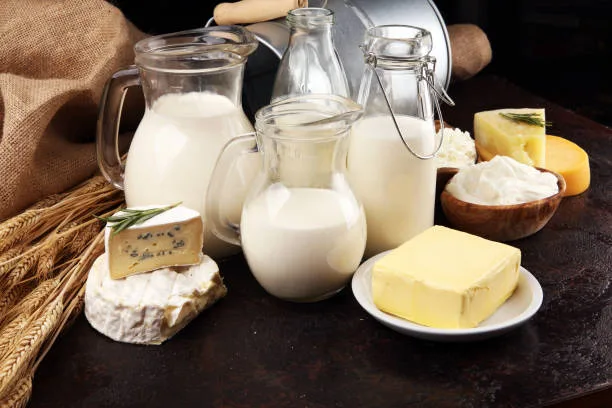
Dairy’s Effects on Metabolism and Weight Management
Dairy foods like yogurt, milk, and cheese appear to influence body weight regulation through several complex metabolic mechanisms. The key nutrients calcium and protein seem to play starring roles.
Calcium and Weight Loss
We briefly touched on how the abundant calcium in dairy can directly promote fat burning and inhibit fat production in cells. Let’s expand on the proposed mechanisms by which calcium supports weight loss and metabolic health:
Promotes Lipolysis: Calcium stimulates lipolysis, which is the breakdown of stored triglycerides into free fatty acids and glycerol so they can be used for energy. It activates lipase enzymes that trigger fat cells to release stored fat from adipose tissue.
Inhibits Lipogenesis: Calcium signals to fat cells to suppress lipogenesis, which is the formation of new fat deposits. It helps reduce activity of fatty acid synthase, an enzyme involved in fat synthesis and storage.
Stimulates Fat Oxidation: Dietary calcium and dairy foods shift metabolism to favor fat oxidation, or the burning of fat for fuel rather than carbs. One study found people burned more fat with a high-dairy versus low-dairy meal containing equal calories.
Reduces Fat Absorption: Calcium can form insoluble soaps with dietary fats in the GI tract, limiting the digestion and absorption of some fatty acids. This allows less fat to be assimilated from a meal.
Regulates Appetite and Cravings: Research indicates calcium and vitamin D may help control appetite-regulating hormones like ghrelin to keep hunger in check. This leads to reduced calorie intake.
Together these diverse effects spur fat breakdown, restrict creation of new fat, increase fat burning, limit dietary fat absorption, and control appetite and cravings. It becomes easy to see how dairy foods rich in calcium encourage weight loss through their influence on fat cells and metabolism.
Dairy Protein Promotes Satiety
Now let’s explore the weight loss benefits of protein, which dairy foods are an excellent source of.
The high-quality protein found in dairy contains all the essential amino acids needed to build and maintain metabolically-active muscle tissue while helping you feel more satisfied after eating. Here’s how it works:
Stimulates CCK: The protein and amino acids in dairy stimulate release of cholecystokinin (CCK), which is a digestive hormone that promotes feelings of fullness and satiety after eating. CCK tells your brain to stop eating.
Balances Blood Sugar: Dairy protein helps prevent huge spikes and crashes in blood sugar that can drive food cravings. It blunts rapid rises in blood glucose, keeping things more balanced.
Provides BCAAs: Branched-chain amino acids like leucine are thought to act directly in the hypothalamus to signal satiety to the brain. Dairy protein provides all the essential BCAAs.
Together, this influence on satiety hormones, glucose control, and hypothalamic regulators results in you feeling fuller and more satisfied after eating dairy protein. This means you’ll be less tempted to overeat at meals or snack between them, effortlessly reducing calorie intake.
Selecting the Best Dairy Foods for Weight Loss
Now that we’ve explored why dairy can benefit weight management on multiple levels, let’s discuss how to choose the right dairy foods to support your diet and fitness goals. Here are some helpful guidelines:
Greek Yogurt: Go Greek for More Protein
Greek yogurt has strained out much of its whey, which concentrates the protein. Just a 6-ounce serving provides 15-20 grams of hunger-quelling protein compared to only 5-7 grams in the same amount of regular yogurt. Plus the dense, rich texture of Greek yogurt helps make it more filling and satisfying. Choose plain, unsweetened varieties and add your own wholesome toppings like fruit, nuts, seeds, or a drizzle of honey if desired. This gives you full control over calories and sugar.
The Milk Debate: Whole vs. Low-Fat
Is whole or low-fat milk better for weight loss? The jury seems to be split when it comes to optimal milk fat levels:
Whole milk benefits: Whole milk provides more satiety with less blood sugar spikes compared to lower fat options. One study found adolescents lost more weight drinking whole vs. skim milk as part of weight loss diets. Whole milk also contains more metabolism-boosting CLA.
Low-fat milk benefits: Low-fat or skim milk is lower in calories while still providing filling protein, calcium and other nutrients. One study found limiting dairy fat intake resulted in more loss of body weight and belly fat compared to whole milk dairy.
The verdict? Either whole or low-fat milk can support weight loss goals since both deliver key nutrients. Whole milk may offer slightly more satiety, while low-fat contains fewer calories. Choose what you prefer based on personal tolerance, calories and taste. Avoid excessive amounts of full-fat dairy if limiting calories.
Cheese: When the Cheese Stands Alone
Research suggests that cheese may be beneficial for weight loss while also controlling hunger and cravings. Again, studies find whole-fat dairy products may confer benefits over low-fat. Just watch portions since cheese is high in calories. Limit to 1-2 servings (1-2 ounces) of your favorite hard cheeses per day. Pair cheese with fiber-rich fruits, veggies or whole grains so you feel satisfied, not stuffed.
Milk Alternatives: Navigating Non-Dairy Choices
With so many plant-based milk alternatives like almond, soy, oat, coconut, and pea milk available, you may be wondering if these are better choices for weight loss compared to cow’s dairy. Here’s what you need to know:
Benefits: Non-dairy milks tend to be lower in calories and fat compared to whole cow’s milk. They are suitable choices for vegans or people with dairy allergies. However, many contain added sugars and thickeners. Also, most plant milks lack the filling protein, vitamin D, calcium, and other micronutrients found naturally in cow’s milk.
The verdict: If you prefer plant-based dairy or need to avoid cow’s milk, opt for unsweetened varieties fortified with calcium and vitamin D when possible. Pea milk and soy milk offer more satiating protein. Consult with a dietitian or nutritionist to help ensure you get enough protein, calcium and other nutrients from your diet if mainly consuming non-dairy alternatives.
Probiotic Power: Fermented Dairy for Gut Health
Emerging research shows there’s a brain-gut connection when it comes to weight management. The balance of microbes in your gut microbiome may influence weight and metabolism. Some small studies suggest probiotic supplements or foods like yogurt with beneficial bacteria can potentially help with weight loss and fat reduction, likely by improving gut and metabolic health. While more research is needed, enhancing your gut microbiome diversity through daily consumption of probiotic-rich fermented foods like yogurt, kefir, and certain cheeses may confer weight loss benefits.
Look for varieties containing live active cultures like Lactobacillus and Bifidobacteria strains, and opt for plain, unsweetened types without added sugars. Those with lactose intolerance can look for lactose-free kefir and yogurt, which still provide probiotics. Kohr brand makes an A2 dairy kefir containing both probiotics and lactase enzyme to improve digestibility.
Dairy Dos and Don’ts
To sum up dairy recommendations for weight loss:
DO: Eat plain Greek yogurt, preferably whole milk for satiety. Add fresh fruit and nuts as toppings. Have a protein-rich smoothie with milk, yogurt, or nut butter. Enjoy 1-2 servings of cheese daily with fruit or whole grain crackers.
DON’T: Drink full-sugar chocolate milk or sweetened lattes. Eat large bowls of ice cream. Have a slice of cheese pizza every day. Consume dairy-based desserts like cheesecake or cream pies.
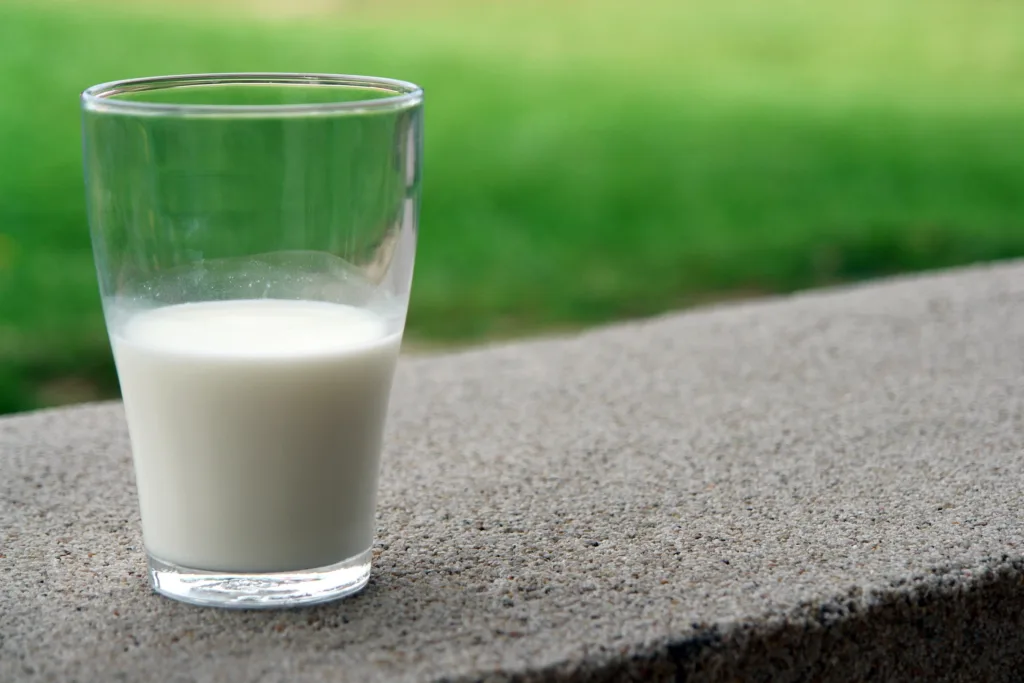
Success Stories: Real People Slim Down with Dairy’s Help
Seeing real-world examples of people who’ve lost weight while enjoying dairy products can provide further inspiration and encouragement on your own weight loss journey. Here are some success stories from folks who slimmed down with dairy by their side:
Amanda’s Story: Less Yo-Yo Dieting, More Yogurt
Amanda had struggled with fad diets for years, constantly losing and regaining the same 10-15 pounds. She decided to take a more sustainable approach and make permanent lifestyle changes. Amanda started adding Greek yogurt every day at breakfast, paired with fruit and nuts. She also began snacking on cottage cheese and string cheese for protein, or carrying a small cooler of veggies and hummus to work.
For Amanda, the high protein dairy foods were instrumental in controlling between-meal cravings, and she no longer felt compelled to binge eat. She steadily lost around 45 pounds over 8 months – without extreme restriction or banning any foods. Amanda says she finally feels in control of her weight long-term thanks to a balanced diet with yogurt and cheese instead of yo-yo dieting.
Mark’s Muscle-Building Milk Strategy
Mark is a fitness enthusiast who wanted to get lean and put on more muscle mass. As a former high school athlete, he knew the power of protein for building strength and performance. When trying to drop fat and gain muscle, Mark made milk and Greek yogurt staples in his diet.
He drank 2% milk post-workout along with whey protein to quickly replenish his body. He ate 0% Greek yogurt for breakfast or snacks for an extra 20+ grams of protein. Cheese slices on his sandwiches and wraps added further protein to keep him feeling energized and full. Increasing his intake of lean dairy protein combined with targeted weight lifting enabled Mark to pack on 7 pounds of lean muscle while also losing fat around his waist.
Sarah’s Story: Slimming Down with a Healthy Gut
Sarah had struggled with persistent digestive issues including bloating, constipation and irregularity. She also slowly gained over 40 pounds over the years. After consulting her doctor and dietitian, Sarah focused on healing her gut health with probiotic supplements, fermented foods like kefir and yogurt, and anti-inflammatory foods.
Within a few weeks of drinking kefir and eating Greek yogurt with live active cultures daily, she noticed improvements in her digestion and energy levels. The boosted gut health and daily probiotics helped regulate her metabolism, digestion, and appetite hormones. Along with ramping up her exercise routine, Sarah’s new gut-friendly diet approach enabled her to steadily shed the excess weight and regain wellness.
Takeaway: Dairy Works for Weight Loss If You Work It In
As you can see from these inspiring real-world examples, enjoying flavorful dairy products like yogurt, cheese, milk, and kefir can absolutely be part of an effective science-backed weight loss strategy. The key is emphasizing the right dairy foods like Greek yogurt and probiotic-rich fermented products, keeping portions in check, and following an overall balanced eating pattern and active lifestyle.
Hopefully this deep dive has unveiled the truth about dairy and weight management while debunking common myths. With the right mindset, realistic expectations, and sensible eating strategies, dairy can be your friend rather than foe when trying to lose weight in a healthy, sustainable way.
Putting Dairy to Work for You: Tips to Torch Fat
Armed with the science-backed information about how dairy foods like milk, yogurt and cheese can influence weight regulation through their nutrients like calcium, protein and probiotics, let’s now discuss practical application. Here are tips for translating the research findings into real life:
Build Your Meals Around Dairy
Construct your meals and snacks around nutrient-dense dairy foods. Have Greek yogurt with fruit and nuts for breakfast. Include cheese and veggies in sandwiches or wraps. Drink a smoothie with milk and yogurt for a snack. Choose dairy as your first ingredient, then add whole food carbs, healthy fats and more.
Read Labels and Choose Wisely
Read labels and opt for unsweetened, low-sugar varieties of milk, yogurt, kefir and cottage cheese with short ingredient lists. Avoid heavily processed “dairy desserts” with added sugars, oils, artificial ingredients and high calorie counts.
Go Greek Yogurt Over Regular
Swap out regular yogurt for protein-packed Greek yogurt. You can even strain regular yogurt at home overnight using cheesecloth to remove some whey and concentrate the protein. Add nutritious mix-ins like chia seeds or diced apple rather than sugary toppings.
Drink Milk Post-Workout
Chocolate milk has long been a recovery drink for athletes thanks to its carb-protein ratio. Drink 2 cups of plain or chocolate milk within 45 minutes after strength training to refuel your muscles. Just be sure to account for the extra calories
Thank you for reading this post, don't forget to subscribe to our free newsletter
!
